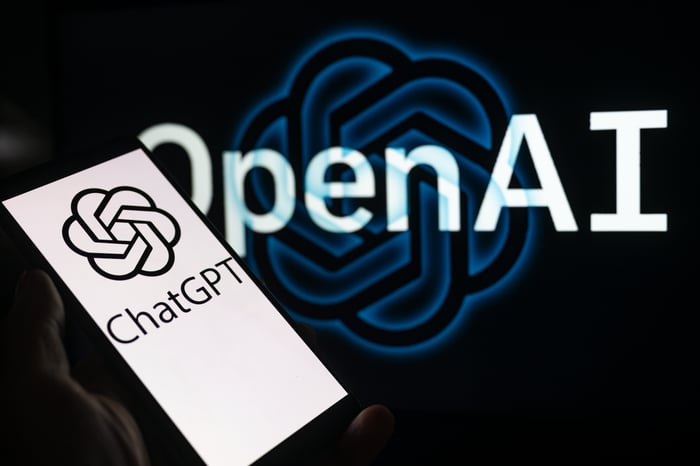Nvidia, Microsoft, SoftBank, and Cathie Wood's Ark Invest Are Betting Big on This AI Startup
OpenAI was founded in 2015 by a team of researchers and entrepreneurs which included Sam Altman, Peter Thiel, and Tesla Chief Executive Offficer Elon Musk. It was established as a not-for-profit research organization with a mission to develop artificial intelligence (AI) technology that benefits all of humanity.
OpenAI planned to raise $1 billion through donations to achieve its research and development goals. After only taking in $130.4 million in donations during its first few years, the organization decided to create a new subsidiary in 2019 which was capable of generating capped profits to attract investors instead.
Since then, OpenAI has developed some of the world's most advanced AI models, which are at the foundation of its ChatGPT chat bot application. Now, OpenAI wants to extend its leadership in the AI industry by fully committing to a for-profit structure, and it just accepted a whopping $6.6 billion in new investment from the likes of Nvidia (NASDAQ: NVDA), Microsoft (NASDAQ: MSFT), SoftBank (OTC: SFTB.Y), Cathie Wood's Ark Invest, and more.

Image source: Getty Images.
The shift to a for-profit AI powerhouse
This isn't the first mega-capital raise OpenAI has closed. Shortly after opening its capped-profit subsidiary in 2019, it entered a strategic partnership with Microsoft that included a $1 billion cash injection. The two companies agreed to collaborate on AI development, with a specific goal to help expand the AI capabilities of Microsoft's Azure cloud computing platform.
Then, at the beginning of 2023, Microsoft said it would invest a further $10 billion, spread across several payments over time.
Since the deal terms were never fully disclosed -- and given OpenAI's current structure -- it's unclear whether Microsoft received an equity stake for its money. But it was widely reported that Microsoft would be entitled to 49% of OpenAI's future profits, if and when it's able to generate any.
The $6.6 billion capital raise that OpenAI just completed, however, could involve equity. According to Reuters, the participating investors will receive convertible notes, which are a debt instrument, and they will convert into equity after OpenAI officially establishes a "public benefit corporation." It's a corporate structure that will let OpenAI make money while maintaining its social mission.
The investors in this latest round (according to The Wall Street Journal and Business Insider) include:
- Nvidia, which invested about $100 million.
- Cathie Wood's Ark Venture Fund, which invested a reported $250 million.
- SoftBank, which invested $500 million.
- Microsoft, which invested less than $1 billion.
- Thrive Capital, which invested a reported $1.25 billion, with an option to invest a further $1 billion next year if OpenAI meets a specific revenue target.
- MGX, a venture firm backed by the United Arab Emirates.
- Altimeter Capital, which is run by veteran tech investor Brad Gerstner.
- Tiger Global.
- Fidelity.
- Khosla Ventures.
There is no guarantee that OpenAI can make the shift to a for-profit enterprise
The establishment of the for-profit entity is subject to approval from the board that oversees OpenAI's nonprofit arm. Typically, due to the nature of convertible notes, the investors would be entitled to their money back if the transition fails to proceed.
Plus, the nonprofit arm owns the intellectual property (IP), which includes all of the AI models and infrastructure that led to ChatGPT, and the formation of a for-profit entity can't leave the nonprofit side worse off (legally speaking). In other words, even if investors own equity in the new for-profit corporation, it's unclear whether they will own a stake in any of the actual IP or anything else that makes OpenAI so valuable.
On Oct. 3, CNBC reported that OpenAI was granted a $4 billion line of credit from a collection of banks including JPMorgan Chase, Goldman Sachs, Citigroup, and more. That will give the start-up a buffer if it runs into any issues with its equity transaction.
OpenAI is growing like a weed
ChatGPT has about 350 million monthly active users. Most of them use it for free, but a small fraction pay a subscription of $20 per month for early access to new features, higher file limits, and more message tokens. OpenAI also licenses its AI models (like GPT-4) to developers, who can use them to create their own AI software applications in exchange for a fee.
OpenAI is reportedly poised to generate $3.7 billion in revenue in 2024. Considering its recent capital raise values the company at $157 billion, that places it at a price-to-sales (P/S) ratio of 42.4 -- in other words, it's even more expensive than Nvidia.
However, OpenAI expects its revenue to grow by a whopping 213% to $11.6 billion in 2025, and according to its long-term forecast, its revenue could top $100 billion per year by 2029. If it hits those targets, its current valuation won't look so bad in hindsight.
However, OpenAI will require a significant amount of capital to get there. Reports suggest it will have a loss of $5 billion this year, which means the $10 billion in combined funding it's about to receive from investors and banks will barely last two years.
Can regular investors buy shares in OpenAI?
Not yet. OpenAI is a private company, so it can choose which investors it wants to work with. Accepting large sums of money from a small number of backers is much easier than offering slivers of the company to millions of smaller investors. Plus, having partners like Nvidia and Microsoft on board as equity holders creates important synergies, as I highlighted earlier.
Brad Gerstner from Altimeter Capital says the start-up's next move should be an initial public offering (IPO), which would let regular investors participate in its future success.
For now, one way investors could gain exposure to OpenAI is by purchasing shares in Microsoft, Nvidia, or even SoftBank. This strategy isn't perfect because those companies are so big that their investment in OpenAI won't move the needle much even if the start-up is wildly successful from here.
As a result, investors who want to get involved directly might have no choice but to wait.
Where to invest $1,000 right now
When our analyst team has a stock tip, it can pay to listen. After all, Stock Advisor’s total average return is 781% — a market-crushing outperformance compared to 168% for the S&P 500.*
They just revealed what they believe are the 10 best stocks for investors to buy right now…
See the 10 stocks »
*Stock Advisor returns as of September 30, 2024
JPMorgan Chase is an advertising partner of The Ascent, a Motley Fool company. Citigroup is an advertising partner of The Ascent, a Motley Fool company. Anthony Di Pizio has no position in any of the stocks mentioned. The Motley Fool has positions in and recommends Goldman Sachs Group, JPMorgan Chase, Microsoft, Nvidia, and Tesla. The Motley Fool recommends the following options: long January 2026 $395 calls on Microsoft and short January 2026 $405 calls on Microsoft. The Motley Fool has a disclosure policy.



